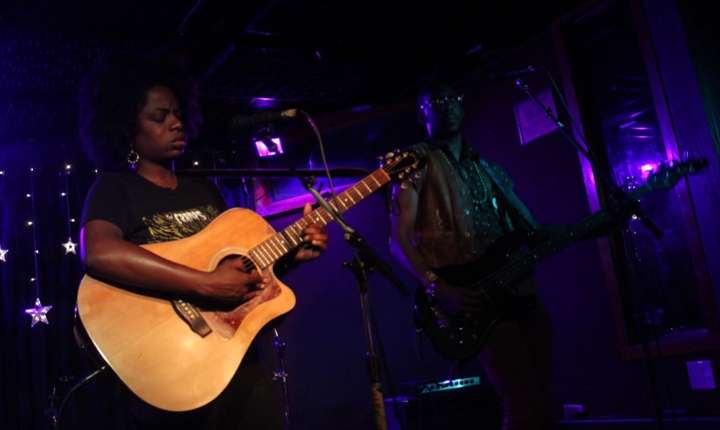
Brian Slattery Photos
Ferrer.
Fernandito Ferrer began the last song of his set Wednesday night with a shaker that he fanned in the air in front of the microphone. His pedal captured the sound. He added whistles uncannily like bird calls, a falling chain that sounded like rain. Then he began playing the guitar and lifting his voice. By the end he had built the song into cascading waves of sound that entranced the full house that had come to Cafe Nine to hear music — and he, humbly, was the opening act.
Ferrer, a music veteran from Puerto Rico by way of Long Island, who has played at Cafe Nine many times and all around the country —including a gig at the Kennedy Center — was paired with Sunny War, a Los Angeles-based musician who has risen steadily in prominence since her debut album, Worthless, in 2015, and was just coming from a performance at the Newport Folk Festival a few days ago. Together Ferrer and Sunny War created an evening of music drenched in culture, tradition, and innovation, to the delight of the many who showed up to hear them.
Ferrer deftly mixed scintillating guitar work, a vivacious vocal style, and complex, interlocking rhythms with a political message. A proud Puerto Rican, he dedicated one song to activist and militant Oscar López Rivera, whom Ferrer called “one of our political prisoners; the song was “a tribute to his life.” His themes of social justice, however, never strayed far from the need to pursue happiness, to find strength in community, and to persevere. His tilt toward joy and hope found willing ears in the Cafe Nine audience, who were rapt during his set and burst into applause after every virtuosic number.

War and Davis.
Sunny War (born Sydney Ward) started off with a rhythm that pushed like big ocean waves, as she and bassist Aroyn Davis filled Cafe Nine with their sound.
“Thanks for being here,” she said toward the beginning of her set, and took the first few songs to settle into her unique fingerpicking style, a two-finger technique that she developed by studying masters of country blues like Chet Atkins, Mississippi John Hurt and Elizabeth Cotten. Her ear then took her in directions equally reminiscent of Saharan guitar players like Mdou Moctar. That technique and her songwriting combined to create a sound that was simultaneously soothing and urgent.
As she warmed up her fingers, War also warmed to the crowd, displaying a sly, self-deprecating wit. “We weren’t expecting anyone to be here because the last time we came here,” she said, and paused for a moment, “there was nobody here.” That drew a laugh from the crowd. “Sorry if we drank a little bit,” she added, drawing another laugh.
The songs grew in intensity, complexity, and virtuosity as the set continued, with War singing and playing matching lines that arched skyward and tumbled back down to earth. Her playing became more angular, more aggressive, and constantly surprising; in time Davis was matching her in moving bass lines. To introduce the song “Age of a Man,” War introduced Davis by saying “we made a video to this song where we dressed Aroyn like a baby.”
Davis agreed. “Hi, I’m Aroyn, and I was dressed as a baby,” he said.
None of the humor in between the songs, however, diluted the music’s power. War introduced the song “Immortal” by saying that it was “about reincarnation…. I wrote it when I was more optimistic about existence.” The darkness in War’s music didn’t make it depressing; it made it hypnotic. Like Ferrer, War’s lyrics often spoke of trauma and suffering, but the music spoke of catharsis, transformation, rebirth. With every note — as one of her own lyrics went — she turned pain into pride.